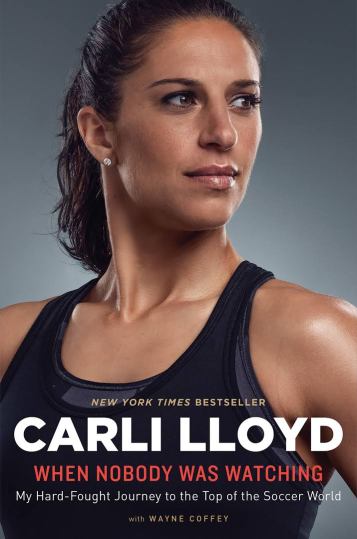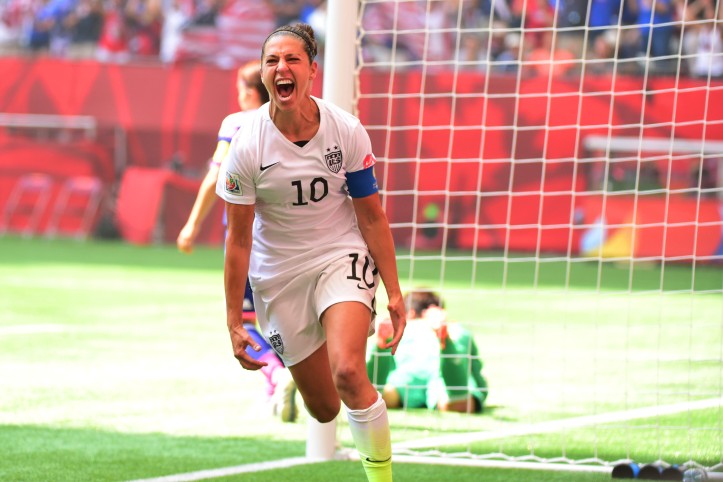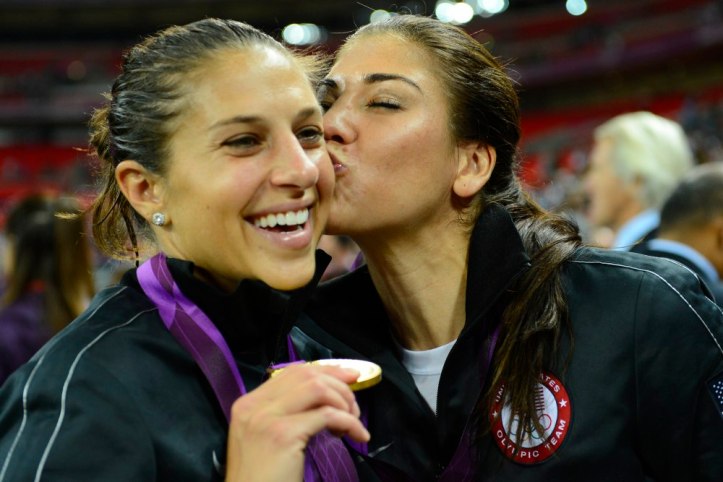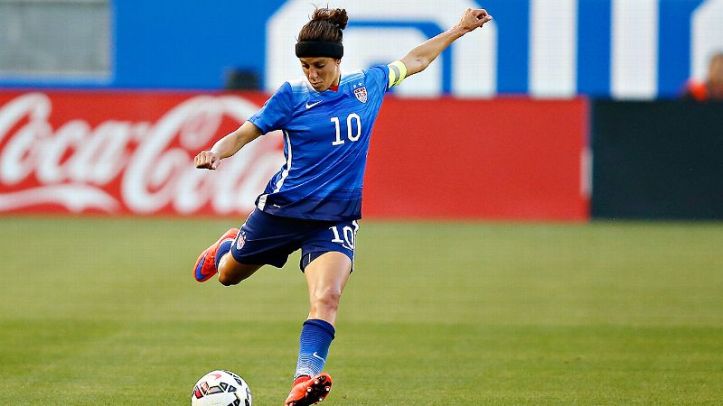When Nobody was Watching: My Hard-Fought Journey to the Top of the Soccer World
by Carli Lloyd with Wayne Coffey
Houghton Mifflin Harcourt, September 2016
Here is a first for Grab the Lapels: a sports book. I was inspired to check out a soccer player’s memoir for two reasons: Fiction Fan reviewed The Perfect Pass, a book about American football, and my adventures watching the Holy Cross College men’s and women’s soccer teams play this fall. I’ve been at HCC for a few years now, but the previous fall I was teaching 5 classes spread out over 2 colleges, so I hadn’t made it to a game before. Fall 2016, though, is a different story. I go to every home game and cheer on current and former students and their teammates. The men’s team is consists mostly of guys from countries where soccer really matters, so they’re pretty intense (and it’s fun to hear all the accents and foreign languages flying all over the place).
However, the women’s soccer team was a dreary thing to watch. I soon learned that the coach only had 9 women to play, when there’s supposed to be 11 on the field. Too many women were injured, so we were short on (wo)manpower. I felt discouraged, as if men’s sports may be better than women’s. After all, isn’t that what everyone says? Women’s sports are a token effort? No one watches them? We even use the adjective “women” (WNBA, for example), as if men’s sports are the default. Then my brain realized I was a jerk and called bullshit. Though the HCC women’s team was dispirited, I wasn’t going to let it affect my attitude anymore. I got Carli Lloyd’s memoir from the library to school my attitude.

In the prologue, Lloyd shares with readers a few things we should know about her: she doesn’t do “fake,” she doesn’t try to increase her social media presence, and she doesn’t sign on for Dancing with the Stars and nearly naked photo shoots with Sports Illustrated. I appreciated this about Lloyd, as I’ve wondered why I see female athletes with make-up and shorter shorts, for example. It doesn’t jive. Lloyd may have a touch of make-up on in her cover image, but she doesn’t wear it on the field. The message is immediately positive for girls and women.
Early on, readers learn that Lloyd has family issues: her parents try to control her career, but she wants to be independent, which I felt was reasonable, especially as she hits her mid-twenties. Lloyd never misses an opportunity to thank her parents for the support and give them credit where it is due, nor does she fail to take the blame when her temper flares. As a result, I trust what’s in Lloyd’s book more because she’s not pointing fingers and deflecting blame.
Lloyd successfully convinced me that no matter her fame, she has doubts about herself. Knowing that a world-class athlete must keep pushing made her relatable and trustworthy in my eyes. She wonders:
How could I have screwed this up? How could this be happening? A year ago I became a gold medal hero and the Player of the Year and now U.S. Soccer doesn’t want to renew my contract. Can anybody tell me how it has gotten to this point?
Never complacent, Lloyd returns home in the off season to train, and even on Christmas day she’s out working with her trainer/mentor, demonstrating how much hard work goes into athletics. The message is work hard, because winners aren’t complacent, a message that translates to all activities.

My favorite parts of the memoir include Hope Solo, a soccer player whose story arcs through the book. First, she’s benched most of the way though a game during which Solo is playing well. Other players on the team apparently lobbied to have her to sit out in exchange for a previously famous goalie who hasn’t played in months. The score of this 2007 World Cup match is United States 0, Brazil 4. Solo goes on television to claim that she would have saved the game and criticized those who wanted her out.
Basically, the woman who replaced her as goalie in the game was well-known years before, but things change quickly in sports. One minute you’re on top, the next, someone fitter has come along. For talking to the media, the entire team shuns Solo. Except Lloyd. As a result, the entire team shuns Solo AND Lloyd, but Carli Lloyd makes it clear that players need to to what’s right, not what’s dramatic. Knowing that Lloyd doesn’t get involved in drama and instead sticks to her principles was impressive and made her seem trustworthy and responsible.
I was wondering how female players may interact differently as a team than male players, and Lloyd addresses this concern:
In men’s sports, people criticize coaches and managers all the time, and sometimes call out teammates too, and it’s not that huge a deal. Things get hot and then it goes away. Often the guy speaking out is even lauded for having the courage to tell the truth. When it happens in women’s sports, though, it always seems to be viewed as a nasty, claws-out catfight. I hate that our World Cup has devolved into this, but I am not going to be part of the Hate Hope Campaign.
Here, Lloyd brings up an important issues. Guys who state their concerns are brave for doing so, but women who do the same thing are catty, bitchy, drama-whores, etc. I’m glad Lloyd outs women’s teams for unfortunately playing to stereotypes, which means maybe we can all move past our double standards.
I like Lloyd’s humility. She never assumes she’s the best player on the team nor that she can make goals on her own. Solo is given credit for “a world-class save” to help her team, for example. To make it clear how her teammates help her look good, Lloyd occasionally goes into soccer replay, during which I read 3-4 pages in some areas describing how the ball was passed and to whom. More insertions of personal moments would have made the book stronger. How do the other teammates interact with Lloyd? How often does she call her long-time boyfriend–and how do they make a long-distance relationship work? What does she do when she’s not training or practicing?

When Nobody was Watching is book meant for soccer fans. If you don’t know the terminology, you can get lost. Here is an example: “It’s a 1-1 game late in the first half when Abby Wambach crosses the ball from the right, through the penalty area toward the left corner, where Stephanie Lopez runs the ball down. Stephanie nutmegs her defender and then toe-pokes a pass back to me.” I was happy to Google terms and learn more about the game, but not every reader will. I also did not look up every term, so I was in the dark a bit. I felt like if I wanted replays, I could YouTube them, but Lloyd’s determination made for an positive read about a female athlete. Continuing the fight for women and girls, Lloyd is part of the group that filed a law-suit against U.S. Soccer for wage discrimination.

Interestingly, Abby Wambach came out with a memoir also published in September of 2016. Was it a race to see which teammate could tell the story of the amazing 2015 World Cup win? I’m not sure, but according to Goodreads, Wambach’s memoir is more personal and less description of soccer. I’ll read her book soon for comparison.


I read lots of sports on a daily basis, but very few books. Loved your analysis of this one and will be interested in the next – by and large I am not interested in sports people’s personal lives but on the other hand it is always interesting to read how people overcome obstacles in whatever field.
LikeLiked by 1 person
Thanks, Bill! I feel like reading memoirs make me pay more attention to the person than ever before. I haven’t read an athlete’s memoir since Johnny Damon’s book several years ago, which made me feel extra betrayed when he switched to the Yankees.
LikeLike
Haha! I am as proud as Punch to have inspired you to read this! See, I’d have understood most of the terminology in this one and you’d probably have understood the stuff in The Perfect Pass. Even though I’m not the biggest soccer fan it’s so much part of the culture here you really can’t avoid knowing at least something about it. But half the fun of reading books like these is in learning about a sport that’s less familiar, anyway, and I’m kinda proud to be one of the few Scots who can now burble on about passing offenses (I even spell it American) and third downs. Sometimes I can even fool people into thinking I know what I’m talking about! 😉
I always enjoy books about people who are passionate about what they do, whether it’s sport or being an astronaut or whatever. It’s easy to focus on the glamour and celebrity and forget how much hard work goes into it. And sports people can be the best role models when they behave sportingly – sounds like Lloyd is getting it right.
LikeLiked by 1 person
Lloyd definitely keeps her nose clean. Wambach, I’ve heard, and many of her teammates, don’t, which is why I want to compare the two memoirs. What’s funny about your comment is I don’t know crap about football and can’t stand it. I went to the University of Notre Dame and never attended a football game.
LikeLiked by 1 person
Good review! This sounds like a great read. I enjoy watching soccer and the US Women’s team are amazing. It would be nice to read more about them. The Abby Wambach book sounds good too.
LikeLiked by 1 person
Definitely! I’ll get to it as soon as I can! How long have you been watching the women’s US team?
LikeLiked by 1 person
I’ve been following the team for quite awhile. I still remember watching Brandi Chastain take her jersey off in ’99 and the uproar that caused! My brother is really into soccer and actually follows the men’s team (and the women sometimes) to all the different games they play. I went to my first men’s game this June, USA vs Columbia in the opening of the Copa. I’d love to see the ladies play!
LikeLiked by 1 person
Alright! I feel like we should high five!
LikeLiked by 1 person
Oh wow. You know this strikes a chord with me. When Sindhu won the silver India’s slogan was “the women we refuse to respect have gotten us respect, stop female infanticide.” Like it takes an olympic medal to stop us from killing female children. Sorry, off topic but that men’s sports is the default point got me thinking. Don’t know if I’ll understand this because of soccer terminology but it sounds brilliant.
LikeLiked by 1 person
I really like the connection you’ve made, and I feel like your quote ties in with how some of the other players on the women’s teams would treat each other. I think the soccer terminology really can get in the way in this memoir unless readers are willing to do some Googling.
LikeLiked by 1 person
Lemme wait a while and see if I still feel like picking it up. Then googling it shall be.
LikeLiked by 1 person
Interesting. Do you still have the book – does she credit her ghostwriter? I’ve got really fussy about this with sports and entertainment memoirs now; mainly because I work with ghostwriters as their transcriber. They don’t expect their name on the front page, but an acknowledgement is nice.
Anyway, sounds like a good read, although the sports descriptions would be as incomprehensible to me, were they about American Football! It’ll be interesting to hear what the other book is like, too.
LikeLiked by 1 person
The ghostwriter’s name is on the cover and his bio is under hers on the back flap of the book, so it’s clear that he’s involved. The bio says that the ghostwriter has helped other athletes write their memoirs. I’m always that curious person who wants to know how much a ghostwriter gets involved. Of course, if seems weird for him to be called a ghostwriter when his name is on the book, but that’s how it is!
LikeLiked by 1 person
Oh, that’s great news, thank you for looking though you didn’t have to look too far.
Usually, the ghostwriter does lots of interviews with the subject and records them. They then either transcribe them or have a good and experienced transcriber transcribe them, because you have to catch the interviewee’s voice when doing that bit. Then they discuss the arrangement of the book, sometimes interview other people, write up a first draft, discuss the draft with the subject, then write up the completed manuscript. A good ghostwriter will be able to capture the subject’s voice such that each of their books will read differently, in a different voice.
LikeLiked by 1 person
When I think “ghostwriter,” I think Sweet Valley Twins.
LikeLiked by 1 person
Oh, then they’re given the plot outline and have to match the style to either a style sheet (hopefully) or other examples in the series. It’s all about ventriloquism, basically.
LikeLiked by 1 person
Great review! I’ll have to try and get hold of a copy of this and the Abby Wambach book. I’m a huge fan of soccer, especially the women’s game. It’s so exciting to see it getting greater recognition, although there’s still a long way to go, especially here in the UK. My frustration at the gender inequality in soccer led me to start knitting reportage in a blog called The Knitted Footballer. I actually knitted a little knitted Carli Lloyd after her hat-trick against Japan in the World Cup final. https://theknittedfootballer.com/2015/07/06/goal-spangled-thriller/ 🙂
LikeLike
I LOVE IT!!! 😀 Does she have a little pony tail? OH MY GOD! OH MY GOD! I can’st stop looking and giggling! I needed this on election day! 😀
LikeLiked by 1 person
Enjoyed your review! I know nothing about soccer whatsoever, except I do know Hope Solo from her not-so-great turn on Dancing with the Stars (which I love.) Soccer in person is much more fun than soccer on television. And my son played soccer last spring, but he’s was 4, and it was called “Soccer for Fun” so it was just mainly skill drills and little kids running around in clumps. That’s the extent of my soccer knowledge! 🙂 Anyway, I’ll be interested in your comparison with the Wambach memoir if you get a chance to read and review it.
LikeLiked by 1 person
Oh, man, watching kids play soccer is the WORST. They really do run around in clumps and all try to get the ball, which is not only disorganized, but suggests that kids are selfish (“ME!”). I’ve got two other books I need to read and then I’m going to try and hit up the Wambach book. Her life sounds truly messy compared to Lloyd’s from what I’ve read, so I’m excited to compare/contrast. I hope your son sticks with it and gets good!
LikeLiked by 1 person
This sounds like such an inspiring read. She sounds like such a great role model to young female athletes and young females in general!
LikeLiked by 1 person
In general, she always keeps her nose clean. At one point she has a minor falling out with Wambach, which makes me wonder how Wambach’s memoir will portray Lloyd.
LikeLiked by 1 person
I like your books. Most of the titles are usually new to me so I get to discover new books and authors. I have never read a sports book and I don’t watch soccer but I like the sound of this book.The second memoir sounds great too especially because the personal story features more than the soccer. Great review.
LikeLiked by 1 person
Thanks, Diana! I enjoyed this book for its explanation of what happened in Lloyd’s succeed career, but there’s not a ton of personal info, which may be a result of Lloyd being so good (she doesn’t do anything to get in trouble), so I’m excited to read Wambach’s book. She has had some bumps in her past, but she also famously kissed her wife on camera after the World Cup.
LikeLike
Wow– great review! I also haven’t really read any sports books… When I reach for a memoir it’s typically from a comedian or politician. But your review inspired me to take more notice in the world of sports memoirs at least. I followed the US Women’s Soccer team pretty closely in 2015/16 with the World Cup and Olympics. I know what the media has told me about Solo, Lloyd, and Wambach, but I like the idea of formulating my own opinions based on these texts.
LikeLiked by 1 person
I knew nothing about these ladies, but I do remember hearing that a soccer player kissed her wife after they won (that was Wambach).
LikeLiked by 1 person
Well, at least you heard something…
LikeLiked by 1 person
[…] what’s going on, or to help me feel situated in this world as the person I am. For instance, Carli Lloyd‘s memoir showed me the strength of women. Jon Krakauer’s Missoula reminded me of the […]
LikeLike
I’m so glad you shared this with me, thank you again! I don’t watch soccer at all (despite playing soccer on a rec center team for like 3 years as a kid), but a few of these details rang a bell from headlines in recent years. This book sounds really interesting, although a little unfortunate there’s parts you really need to be knowledgeable about soccer to understand–but I can understand why, too, I probably wouldn’t be able to resist myself, haha. This was such a great review!
LikeLike
Thank you! You’ve likely heard Lloyd’s name in the media because she fought to have women soccer players paid the same as men. People argued that women’s games don’t sell as many tickets as men’s, or they’re not watched as much. The women’s U.S.A. soccer team proved that wrong! I think I heard JUST RECENTLY that they are finally getting their equal pay. It’s taken forever *eye roll*
LikeLiked by 1 person
I do believe that’d be where! I remember when it was all over the news and social media. I’m glad they’re finally getting it! There is a lot of similar conflict in hockey because the NWHL has squat next to the NHL and definitely doesn’t get anywhere near as much attention. It’s not as big a league, but still. It could grow if given the chance and equality to.
LikeLiked by 1 person
[…] World Cup, and the fight for pay equality. A few years ago, I read Carli Lloyd’s 2016 memoir, When Nobody Was Watching. She played on the same teams as Abby Wambach, whose 2016 memoir, Forward, takes a different […]
LikeLike
[…] celebrity memoirs that sound ditzy. Although I appreciate the athleticism of Abby Wambach and Carli Lloyd, both sounded like, “OMG, BFF!!!” in their memoirs. And my beloved Joan Fontaine wrote […]
LikeLike